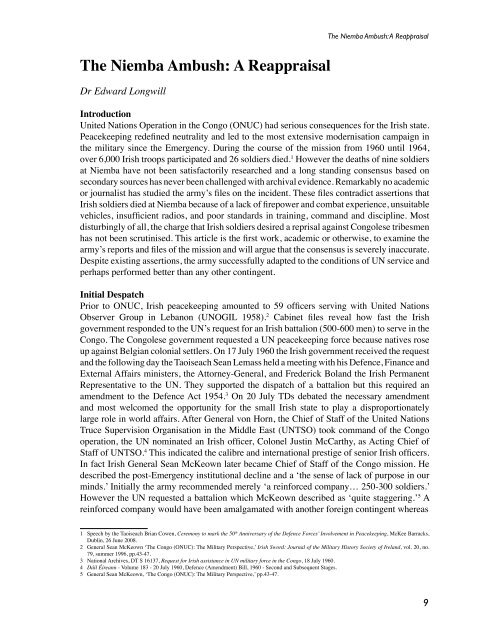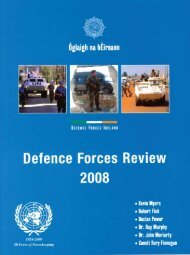Defence Forces Review 2010
Defence Forces Review 2010
Defence Forces Review 2010
You also want an ePaper? Increase the reach of your titles
YUMPU automatically turns print PDFs into web optimized ePapers that Google loves.
The Niemba Ambush: A ReappraisalDr Edward LongwillThe Niemba Ambush: A ReappraisalIntroductionUnited Nations Operation in the Congo (ONUC) had serious consequences for the Irish state.Peacekeeping redefined neutrality and led to the most extensive modernisation campaign inthe military since the Emergency. During the course of the mission from 1960 until 1964,over 6,000 Irish troops participated and 26 soldiers died. 1 However the deaths of nine soldiersat Niemba have not been satisfactorily researched and a long standing consensus based onsecondary sources has never been challenged with archival evidence. Remarkably no academicor journalist has studied the army’s files on the incident. These files contradict assertions thatIrish soldiers died at Niemba because of a lack of firepower and combat experience, unsuitablevehicles, insufficient radios, and poor standards in training, command and discipline. Mostdisturbingly of all, the charge that Irish soldiers desired a reprisal against Congolese tribesmenhas not been scrutinised. This article is the first work, academic or otherwise, to examine thearmy’s reports and files of the mission and will argue that the consensus is severely inaccurate.Despite existing assertions, the army successfully adapted to the conditions of UN service andperhaps performed better than any other contingent.Initial DespatchPrior to ONUC, Irish peacekeeping amounted to 59 officers serving with United NationsObserver Group in Lebanon (UNOGIL 1958). 2 Cabinet files reveal how fast the Irishgovernment responded to the UN’s request for an Irish battalion (500-600 men) to serve in theCongo. The Congolese government requested a UN peacekeeping force because natives roseup against Belgian colonial settlers. On 17 July 1960 the Irish government received the requestand the following day the Taoiseach Sean Lemass held a meeting with his <strong>Defence</strong>, Finance andExternal Affairs ministers, the Attorney-General, and Frederick Boland the Irish PermanentRepresentative to the UN. They supported the dispatch of a battalion but this required anamendment to the <strong>Defence</strong> Act 1954. 3 On 20 July TDs debated the necessary amendmentand most welcomed the opportunity for the small Irish state to play a disproportionatelylarge role in world affairs. After General von Horn, the Chief of Staff of the United NationsTruce Supervision Organisation in the Middle East (UNTSO) took command of the Congooperation, the UN nominated an Irish officer, Colonel Justin McCarthy, as Acting Chief ofStaff of UNTSO. 4 This indicated the calibre and international prestige of senior Irish officers.In fact Irish General Sean McKeown later became Chief of Staff of the Congo mission. Hedescribed the post-Emergency institutional decline and a ‘the sense of lack of purpose in ourminds.’ Initially the army recommended merely ‘a reinforced company… 250-300 soldiers.’However the UN requested a battalion which McKeown described as ‘quite staggering.’ 5 Areinforced company would have been amalgamated with another foreign contingent whereas1 Speech by the Taoiseach Brian Cowen, Ceremony to mark the 50 th Anniversary of the <strong>Defence</strong> <strong>Forces</strong>’ Involvement in Peacekeeping, McKee Barracks,Dublin, 26 June 2008.2 General Sean McKeown ‘The Congo (ONUC): The Military Perspective,’ Irish Sword: Journal of the Military History Society of Ireland, vol. 20, no.79, summer 1996, pp.43-47.3 National Archives, DT S 16137, Request for Irish assistance in UN military force in the Congo, 18 July 1960.4 Dáil Éireann - Volume 183 - 20 July 1960, <strong>Defence</strong> (Amendment) Bill, 1960 - Second and Subsequent Stages.5 General Sean McKeown, ‘The Congo (ONUC): The Military Perspective,’ pp.43-47.9
















